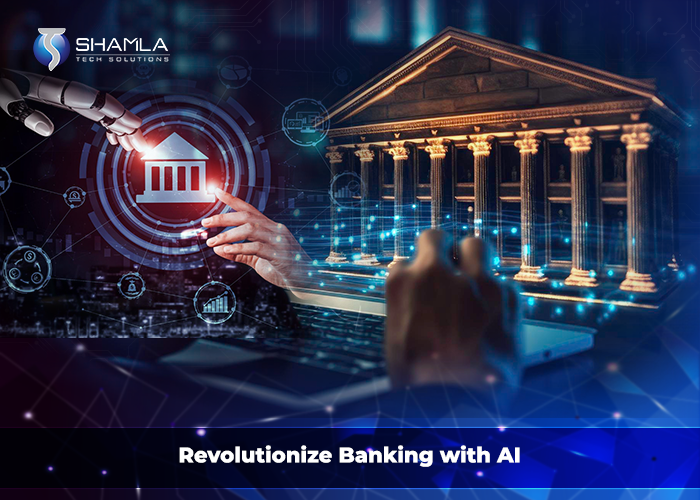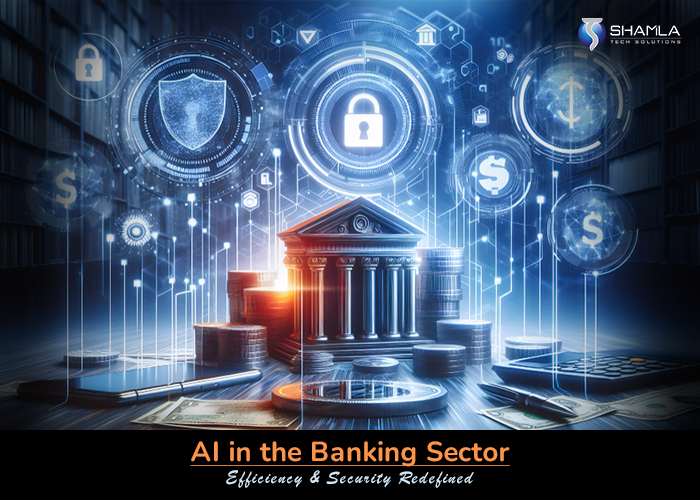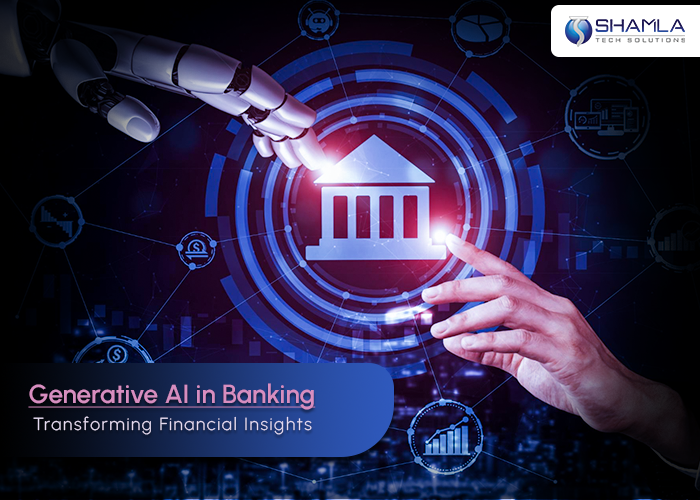Understanding AI in Banking and Finance
Artificial intelligence (AI) is revolutionizing the banking and finance sector by enhancing efficiency, security, and customer experience. AI in banking and finance encompasses a range of technologies that enable financial institutions to analyze large volumes of data, automate processes, and provide personalized services.
AI in financial services includes the use of machine learning algorithms to predict market trends, assess credit risk, and detect fraudulent activities. These capabilities allow financial institutions to make more informed decisions and improve their risk management strategies. For instance, AI-driven credit scoring models can analyze a vast array of data points to assess a borrower’s creditworthiness more accurately than traditional methods.
Generative AI in banking and finance is a burgeoning field, with applications such as creating financial models, generating insightful reports, and enhancing customer interactions through sophisticated chatbots. These generative AI systems can simulate various financial scenarios, providing banks with valuable insights into potential market movements and investment opportunities.
The integration of fintech artificial intelligence is another significant development in the AI in the banking sector. Fintech companies leverage AI to offer innovative solutions such as robo-advisors, automated trading systems, and AI-powered financial planning tools. These advancements enable fintech firms to provide highly personalized and efficient services, often at a lower cost than traditional financial institutions.
In the banking sector, AI is being utilized to streamline operations, from automating routine tasks like data entry to optimizing complex processes such as loan approval and compliance monitoring. AI-powered chatbots and virtual assistants are enhancing customer service by providing 24/7 support and resolving queries in real time.
Overall, the adoption of artificial intelligence in banking and financial services is transforming the industry. By harnessing the power of AI, financial institutions can enhance their operational efficiency, provide better customer experiences, and stay competitive in a rapidly evolving market.

Benefits of Artificial Intelligence in Banking
Artificial intelligence (AI) in banking and finance offers numerous benefits that enhance operational efficiency, customer experience, and security. The integration of AI in financial services is revolutionizing the industry, providing financial institutions with advanced tools to stay competitive and meet evolving customer needs.
One of the primary benefits of AI in banking and finance is improved customer service. AI-powered chatbots and virtual assistants can handle a wide range of customer inquiries, providing instant responses and personalized assistance. These AI systems are available 24/7, ensuring that customers can receive support at any time, which significantly enhances customer satisfaction and loyalty.
AI in financial services also boosts security by enabling sophisticated fraud detection and prevention. Machine learning algorithms can analyze transaction patterns and identify anomalies that may indicate fraudulent activities. This allows banks to detect and respond to potential fraud more quickly and effectively, protecting both the institution and its customers
Generative AI in banking is transforming how financial data is analyzed and reported. These AI systems can generate detailed financial reports, create predictive models, and simulate various market scenarios. This capability helps financial institutions make more informed decisions, optimize their investment strategies, and manage risks more effectively.
The use of fintech artificial intelligence is driving innovation in the financial sector. Fintech companies are leveraging AI to develop advanced financial products and services, such as robo-advisors, automated trading systems, and AI-driven financial planning tools. These innovations provide customers with more efficient and personalized financial solutions.
AI in the banking sector also streamlines operational processes. Tasks such as loan approvals, compliance monitoring, and data entry can be automated using AI, reducing the workload for human employees and minimizing the risk of errors. This not only improves efficiency but also allows employees to focus on more strategic and value-added activities.
In summary, the adoption of artificial intelligence in banking and financial services is transforming the industry by enhancing customer service, improving security, driving innovation, and streamlining operations. As AI technology continues to evolve, its impact on the banking sector will likely grow, offering even more opportunities for financial institutions to optimize their services and operations.
AI in Financial Services
Artificial intelligence (AI) in financial services is transforming the industry by enhancing efficiency, accuracy, and customer satisfaction. The adoption of AI in banking and finance provides financial institutions with powerful tools to optimize operations, manage risks, and deliver personalized services.
One of the key applications of AI in financial services is in risk management. Machine learning algorithms analyze vast amounts of data to identify patterns and predict potential risks, such as credit defaults or market fluctuations. This allows financial institutions to make data-driven decisions, mitigate risks, and improve their overall financial stability.
AI also plays a significant role in fraud detection and prevention. Artificial intelligence in banking systems can monitor transactions in real-time, identifying unusual patterns that may indicate fraudulent activity. This enables banks to quickly detect and respond to potential threats, protecting both the institution and its customers.
Generative AI in finance is another emerging application. These advanced AI systems can create detailed financial models, generate predictive analytics, and simulate various economic scenarios. This helps financial institutions to better understand market dynamics, optimize investment strategies, and enhance decision-making processes.
In the realm of customer service, AI-powered chatbots and virtual assistants are revolutionizing how financial institutions interact with their clients. These AI systems provide instant, personalized responses to customer inquiries, improving service efficiency and customer satisfaction. By handling routine inquiries, AI allows human employees to focus on more complex tasks, enhancing overall productivity.
Fintech companies are at the forefront of integrating AI into financial services. Fintech artificial intelligence solutions, such as robo-advisors and automated trading platforms, offer customers innovative and cost-effective financial products. These AI-driven solutions provide personalized financial advice and execute trades with high precision and speed.
AI in the banking sector is also streamlining administrative processes. Tasks such as document verification, data entry, and compliance monitoring can be automated using AI, reducing manual errors and operational costs.
Overall, AI in financial services is driving significant improvements in risk management, fraud prevention, customer service, and operational efficiency. As AI technology continues to evolve, its impact on the financial industry will likely expand, offering even more opportunities for innovation and growth.

Generative AI in Banking
Generative AI in banking is a transformative force that is reshaping the financial sector. Leveraging advanced machine learning models, generative AI can create new data, insights, and predictive models that enhance decision-making processes and operational efficiency. This innovative technology is becoming increasingly integral to AI in banking and finance.
One of the primary applications of generative AI in banking is in the creation of detailed financial models. These models can simulate various economic scenarios, allowing banks to better understand potential market movements and prepare for a range of outcomes. This predictive capability helps in strategic planning and risk management, enabling financial institutions to make more informed decisions.
Generative AI in finance is also enhancing customer service through advanced chatbots and virtual assistants. These AI systems are capable of understanding and generating human-like responses, providing personalized interactions with customers. They can handle a wide range of queries, from basic account information to complex financial advice, thus improving the customer experience and freeing up human agents for more intricate tasks.
In the realm of fraud detection, generative AI plays a crucial role. By analyzing patterns in transaction data, it can generate profiles of typical behavior and identify deviations that might indicate fraudulent activities. This allows for real-time monitoring and rapid response to potential threats, significantly enhancing the security of financial transactions.
Fintech companies are at the forefront of integrating generative AI into their services. Fintech artificial intelligence solutions use generative models to develop innovative financial products and services, such as automated trading algorithms and personalized financial planning tools. These applications provide users with tailored financial advice and investment strategies, enhancing the overall value proposition of fintech platforms.
In the broader AI in banking sector, generative AI is also used for regulatory compliance and reporting. It can generate comprehensive reports that adhere to regulatory standards, ensuring that financial institutions remain compliant with evolving laws and regulations. This not only reduces the burden of manual reporting but also minimizes the risk of non-compliance.
Overall, generative AI in banking and finance is driving significant advancements in predictive analytics, customer service, fraud detection, and regulatory compliance. As financial institutions continue to adopt this technology, the landscape of the banking sector will evolve, becoming more efficient, secure, and customer-centric.
Fintech Artificial Intelligence Innovations
Fintech artificial intelligence (AI) innovations are significantly transforming the banking and finance sectors, driving efficiency, personalization, and security. The integration of AI in banking and finance has led to the development of advanced financial products and services that cater to the evolving needs of customers.
One of the most notable innovations in fintech is the rise of robo-advisors. These AI-driven platforms provide automated, algorithm-based financial planning services with minimal human intervention. Robo-advisors analyze a client’s financial situation and goals to create personalized investment strategies, making wealth management accessible to a broader audience. This application of AI in financial services has democratized investment, providing expert financial advice at a fraction of the traditional cost.
Generative AI in finance is another breakthrough, particularly in developing predictive models and simulations. Generative AI can analyze vast datasets to generate insights and forecast market trends, enabling financial institutions to make informed investment decisions. In banking, generative AI can simulate various economic scenarios to aid in risk management and strategic planning, thus enhancing the decision-making process.
AI-powered fraud detection systems have revolutionized security in the financial sector. Artificial intelligence in banking utilizes machine learning algorithms to detect unusual patterns and anomalies in transaction data. This real-time analysis allows for prompt identification and prevention of fraudulent activities, significantly reducing financial crimes and enhancing customer trust.
Customer service has also seen significant improvements through fintech artificial intelligence. AI-driven chatbots and virtual assistants provide 24/7 customer support, handling a wide range of inquiries from account information to complex financial advice. These AI systems ensure efficient, personalized interactions, improving customer satisfaction and loyalty.
In the broader AI in the banking sector, innovations extend to credit scoring and lending. AI models can assess a borrower’s creditworthiness more accurately by analyzing non-traditional data sources, thereby expanding access to credit for underserved populations. This application of AI in financial services promotes financial inclusion and economic growth.
Overall, fintech artificial intelligence innovations are reshaping the landscape of banking and finance. From robo-advisors and generative AI in banking to advanced fraud detection and personalized customer service, AI is driving the industry toward greater efficiency, security, and accessibility. As these technologies continue to evolve, their impact on the financial sector will undoubtedly expand, offering new opportunities for innovation and growth.

AI in the Banking Sector
Artificial intelligence (AI) in banking and finance is revolutionizing the industry by enhancing efficiency, security, and customer service. The integration of AI in financial services enables banks to analyze large datasets, automate processes, and deliver personalized experiences, thereby transforming traditional banking operations.
One of the key applications of AI in the banking sector is in customer service. AI-powered chatbots and virtual assistants provide 24/7 support, handling a wide range of customer inquiries with speed and accuracy. These AI systems improve customer satisfaction by offering instant responses and personalized recommendations, freeing up human agents to focus on more complex issues.
Generative AI in banking is another transformative application. It is used to create predictive models, financial forecasts, and risk assessments. By analyzing historical data and simulating various economic scenarios, generative AI helps banks make more informed decisions, optimize investment strategies, and manage risks effectively.
Fraud detection is a critical area where AI in financial services has made a significant impact. Machine learning algorithms can analyze transaction patterns in real-time, identifying anomalies that may indicate fraudulent activity. This allows banks to detect and respond to potential fraud more quickly, protecting both the institution and its customers from financial losses.
AI in banking and finance also streamlines back-office operations. Tasks such as data entry, loan processing, and compliance monitoring can be automated, reducing manual errors and operational costs. AI-driven automation increases efficiency and allows employees to focus on strategic initiatives that add more value to the organization.
Fintech artificial intelligence is driving innovation across the financial industry. Fintech companies leverage AI to develop advanced financial products, such as robo-advisors and automated trading systems. These solutions offer personalized financial advice and execute trades with high precision, providing a competitive edge in the market.
Ethical Considerations and Challenges in Using AI in Banking and Finance
The implementation of AI in banking and finance brings numerous benefits, but it also presents several ethical considerations and challenges. As artificial intelligence in banking continues to evolve, addressing these concerns is crucial for maintaining trust and integrity in the financial sector.
1.Bias and Fairness:
AI systems can inadvertently perpetuate biases present in their training data, leading to unfair treatment of certain customer groups. For instance, AI-driven credit scoring models might unfairly disadvantage minority groups if the historical data used is biased. Ensuring fairness requires rigorous testing and the implementation of algorithms that can detect and mitigate biases.
2.Transparency and Accountability:
The decision-making processes of AI in financial services can be opaque, making it difficult for customers and regulators to understand how decisions are made. This lack of transparency can erode trust. Financial institutions must strive for explainable AI, where the rationale behind AI decisions is clear and comprehensible.
3.Data Privacy:
AI in banking relies heavily on data, raising significant privacy concerns. Ensuring that customer data is collected, stored, and processed securely is paramount. Compliance with data protection regulations, such as GDPR, is essential to protect customer privacy and maintain trust.
4.Security Risks:
AI systems can be targets for cyberattacks, posing risks to financial stability and customer data. Implementing robust security measures and continuously monitoring AI systems for vulnerabilities is crucial to safeguard against these threats.
5.Ethical Use of Generative AI:
Generative AI in banking and finance can create realistic but fake data, which could be misused. Ensuring that generative AI is used ethically, particularly in generating financial models and reports, is important to prevent misinformation and fraud.
6.Job Displacement:
The automation of tasks through AI can lead to job displacement in the banking sector. While AI can improve efficiency, it is important to consider the social impact and support retraining and upskilling initiatives for affected employees.
7.Regulatory Compliance:
AI in financial services must comply with evolving regulatory standards. Ensuring that AI systems adhere to legal requirements and industry standards is essential to avoid legal repercussions and maintain ethical standards
Addressing these ethical considerations and challenges requires a comprehensive approach that includes developing fair and transparent AI systems, ensuring data privacy and security, and fostering a regulatory environment that supports responsible AI use. By doing so, the banking sector can harness the benefits of AI while maintaining public trust and upholding ethical standards.

Future Trends in AI in Financial Services
The landscape of AI in banking and finance is rapidly evolving, driven by continuous advancements in technology and increasing demand for innovative financial solutions. The future of artificial intelligence in banking and financial services promises to bring even more transformative changes, enhancing efficiency, security, and customer experience. Here are some key trends to watch for:
1. Enhanced Personalization
AI in financial services will continue to push the boundaries of personalized banking experiences. Using advanced data analytics and machine learning, financial institutions can tailor products and services to individual customer needs. Personalized financial advice, tailored investment strategies, and custom loan offers are just the beginning. AI will enable banks to anticipate customer needs and provide proactive solutions, fostering deeper customer relationships.
2. Advanced Fraud Detection and Prevention
As cyber threats become more sophisticated, the need for robust security measures in the financial sector intensifies. AI and machine learning algorithms will play a crucial role in detecting and preventing fraud. These systems can analyze vast amounts of transaction data in real-time, identifying unusual patterns and flagging potential fraudulent activities before they occur. The integration of AI will enhance the security framework of financial institutions, protecting them and their customers from financial crimes.
3. Generative AI in Banking
Generative AI is set to revolutionize the banking sector by automating complex financial tasks. This includes generating financial reports, creating predictive models, and simulating various economic scenarios. Generative AI in banking will streamline operations, reduce the need for manual interventions, and provide banks with deeper insights into market trends and risks. This technology will also enhance decision-making processes, allowing for more accurate and data-driven strategies.
4. AI-Powered Financial Advisors
The rise of AI-powered financial advisors, or robo-advisors, is another significant trend. These digital platforms use AI algorithms to provide investment advice, portfolio management, and financial planning services. Robo-advisors offer a cost-effective alternative to traditional financial advisors, making financial planning accessible to a broader audience. As these platforms become more sophisticated, they will be able to handle more complex financial scenarios, providing high-quality advice with minimal human intervention.
5. Integration of AI in Fintech
Fintech companies are at the forefront of integrating AI into their offerings. Fintech artificial intelligence solutions include automated trading systems, AI-driven credit scoring, and blockchain-based platforms. These innovations will continue to disrupt traditional financial models, offering faster, more efficient, and more transparent financial services. The collaboration between fintech firms and traditional banks will likely increase, leading to more integrated and comprehensive financial ecosystems.
6. Enhanced Regulatory Compliance
AI will play a pivotal role in ensuring regulatory compliance in the financial sector. AI-powered tools can monitor transactions, analyze compliance data, and generate reports in real-time, ensuring that financial institutions adhere to regulatory standards. This not only reduces the risk of non-compliance but also minimizes the resources required for regulatory reporting and auditing.
7. Ethical AI Development
As AI becomes more integral to financial services, ethical considerations will take center stage. Ensuring that AI systems are transparent, fair, and unbiased will be crucial. Financial institutions will need to implement robust frameworks for ethical AI development, addressing issues such as data privacy, algorithmic bias, and accountability. This will help build trust and ensure the responsible use of AI in the banking sector.
The future of AI in banking and finance is bright, with numerous innovations on the horizon. From enhanced personalization and advanced fraud detection to the rise of generative AI and AI-powered financial advisors, the integration of AI in financial services promises to bring unparalleled efficiency, security, and customer satisfaction. As financial institutions continue to adopt these technologies, they will be better positioned to navigate the complexities of the modern financial landscape and deliver superior value to their customers.
Conclusion:
The adoption of AI in banking and finance is reshaping the industry by providing enhanced personalization, improved fraud detection, and efficient operational processes. With advancements in generative AI, fintech artificial intelligence, and AI-powered financial advisors, the future of financial services looks promising. However, addressing ethical considerations and regulatory compliance will be crucial to maintaining trust and integrity. As financial institutions continue to leverage AI technologies, they will be better equipped to navigate the complexities of the modern financial landscape, ultimately delivering superior value to their customers and stakeholders.









